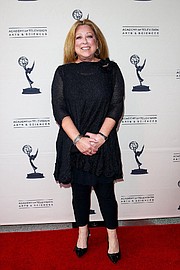In books, TV series and documentaries, standup comics of the 1970s have become nearly as mythologized as the auteurs of the New Hollywood. If Richard Pryor, David Letterman and Andy Kaufman were the Martin Scorsese, Steven Spielberg and Francis Ford Coppola of the club scene, then Elayne Boosler is the Hal Ashby, the misunderstood master who never got proper due.
This makes the release of her new boxed set Timeless, which includes four of her old specials along with one new album, a prime opportunity to reassess her role in the comedy canon.
The Brooklyn-born Boosler, now 66, started performing at the Improv in New York in 1973, and before the decade was out, she was widely regarded as an elite club comic on both coasts, one of the few female stars in male-dominated rooms.
Yet she never got her big break in the form of her own network sitcom or talk show and had limited success getting booked on the Tonight show, where Johnny Carson preferred female comics who were not aggressive. When Larry King asked Boosler on CNN, "Why is comedy considered not for women?," the question answered itself. Boosler's career clearly suffered from systemic sexism, the impossible bind that demanded women command the stage without being too commanding. You see this perhaps most clearly in her positive reviews, which maintained that she was not abrasive or feminist, as if that would scare away audiences.
She also developed a reputation in the industry for being difficult, and untangling this from the sexism can be hard. Yet the narrative surrounding her -- of a career thwarted -- can be overstated, when the stand-up special has become such an important genre. Make no mistake: Boosler was its first female star, regularly putting out hours of jokes on cable in the 1980s and early '90s that represented a break from the past. Unlike the acts of Joan Rivers and Phyllis Diller, there was not a whiff of the borscht belt or the coffeehouse about her material. Her act -- hard-hitting, topical and dense with punchlines -- anticipated the future of comedy better than most if not all of her peers.
Boosler took pride in being a female comic who didn't make herself the butt of the joke. Much of her act, alternating between scathing political gibes with raunchy takes on the life of a slovenly single woman, would not be out of place in the current material of Amy Schumer, Michelle Wolf or Ali Wong.
Her 1986 debut special, Party of One, on Showtime, was a major breakthrough. (HBO debuted Women of the Night the next year, a showcase for female stand-ups that introduced a generation of stars including Rita Rudner, Paula Poundstone, Joy Behar, Susie Essman and Ellen DeGeneres.) Party of One is dedicated to Andy Kaufman, Boosler's ex-boyfriend and sometime collaborator who died in 1984, and it focuses on the absurdity of dating with the giddy glee of a long-awaited debrief with your best friend. She makes walks of shame or sex talk gone wrong seem like ridiculous fun, and domesticity (cooking, cleaning, doing laundry) seem like a bore. Men, she sighs, expect her to cook breakfast the morning after sex. "They want things like toast," she says, exasperated. "I don't have these recipes."
She's surgical in her attack on double standards in show business and beauty, including how men have more leeway in aging, echoing jokes on her new album, The 50/50 Club, that poke fun at the way weight makes a woman invisible: "If I gain 10 more pounds, I'm going to spy for the government."
Her second and third specials, Broadway Baby and Top Tomata, were even more political, if still not the least bit dogmatic, skewering the gender pay gap, sexual harassment and the way female candidates are expected to hold back emotions.
These specials suffer from overproduced introductions that are at odds with Boosler's comedy club roots. Party of One opens with cameos by Bill Cosby and Letterman that are transparent attempts to establish her bona fides by using major stars of the day.
A more convincing argument for Boosler's place in the pantheon can be found in her regular appearances on Late Night With David Letterman. Her jokes arrived with a knowing attitude that fit the insider mood of that NBC show, which booked her one month after its premiere, the first woman to do stand-up there.
Style on 10/07/2018

